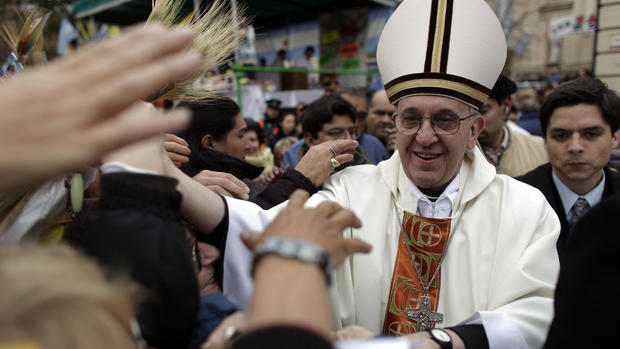Pope Francis' partial lung shouldn't present problems unless he gets sick, experts say
Pope Francis will have to navigate leading the Catholic church without both lungs intact.
The Argentine pontiff, born Jorge Mario Bergoglio, underwent surgery as a young man to remove "a good part" of an infected lung, according to his authorized biographer, Sergio Rubin. "He feels it today," says Rubin. "He's a little bit slowed by it, but he's OK."
It was initially reported that Francis lost an entire lung, but the Vatican said Thursday that he had only lost part of one and provided no further details.
Doctors said that losing part of one lung doesn't necessarily compromise the pope's health or reduce his life span, though it means no strenuous exercise since he no longer has as much air capacity as people with two lungs. "He probably wouldn't be able to run marathons, but I don't think that would be on his schedule," said Dr. Peter Openshaw, director of the Centre for Respiratory Infection at Imperial College London. "Having one lung should be enough as long as there is no other disease in that lung."
Openshaw didn't think a papal schedule would be too taxing for Francis' one lung, though he noted the pope's rib cage might look slightly unusual. "His X-ray will probably look rather alarming, but understandable once you know he only has one lung," he said.
Openshaw explained that Francis' whole lung would probably have expanded to fill the space left by the missing one, and that his rib cage would have shrunk slightly in size. His diaphragm may also have moved up slightly higher than normal. But none of those changes should affect Francis' normal activities, he said.
He said the pope's whole lung should be able to compensate for the missing one, similar to how parts of the brain may pick up functions of other regions damaged by a stroke.
"The other lung can gain capacity but there will be limits," he said, comparing it to a car engine that now runs slightly slower. "You may not be able to accelerate as hard but it still works just as well."
Experts said it would be rare nowadays to remove a lung. Antibiotics would be used to treat most lung infections including tuberculosis, though part of the organ might be removed to treat advanced lung cancer.
Back when Francis had part of his lung removed, the available antibiotics weren't as powerful. "In the past, doctors used to try all kinds of strange things to try to treat lung infections," said Dr. Jennifer Quint, a respiratory expert at London's School of Hygiene and Tropical Medicine. She said physicians even used to stick ping pong balls into peoples' lungs in an attempt to starve the lung of oxygen, to kill the bacteria.
Quint said the fact that Francis appears so fit and healthy at 76 bodes well for his future.
"If he were going to have any major complications from the surgery (to remove the lung), he would have had them by now," she said. She said Francis' main challenge will be to keep his remaining lung healthy. "I would recommend a yearly flu vaccination and an occasional pneumonia vaccine to avoid infection," she said.
- Pope Francis begins 1st full day as pontiff with prayer to Virgin Mary
- What's next for Pope Francis?
- Jorge Bergoglio: Who is the new pope?
Dr. Robert Glatter, an emergency medicine physician at Lenox Hill Hospital in New York City, wrote on Forbes that people with one functioning lung can generally engage in activities without difficulty.
"It is not necessary to have two lungs for survival, similar to patients who can survive with only one kidney," according to Glatter. "They can lead normal lives just as persons with two lungs -- assuming they remain healthy."
Jeremy Ward, a professor of respiratory physiology at King's College London, said if the pope gets sick he could face added risks.
"If he gets any sort of infection, it could be much more serious in him than in someone else with two lungs. ... That could make him susceptible to pneumonia, which would be very dangerous for him." he said, adding it would either take the pope longer to recover or debilitate him.
Glatter said a lung infection like bronchitis could also put the pope at risk.
Still, Ward didn't think Francis would have to take any unusual measures to avoid getting sick and faced the same problems as all elderly people.
"Unfortunately as you get older, nothing works as well as it should," he said. "He will have to deal with that like everybody else."
